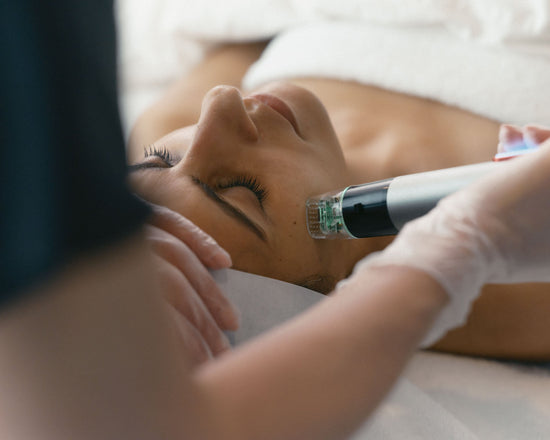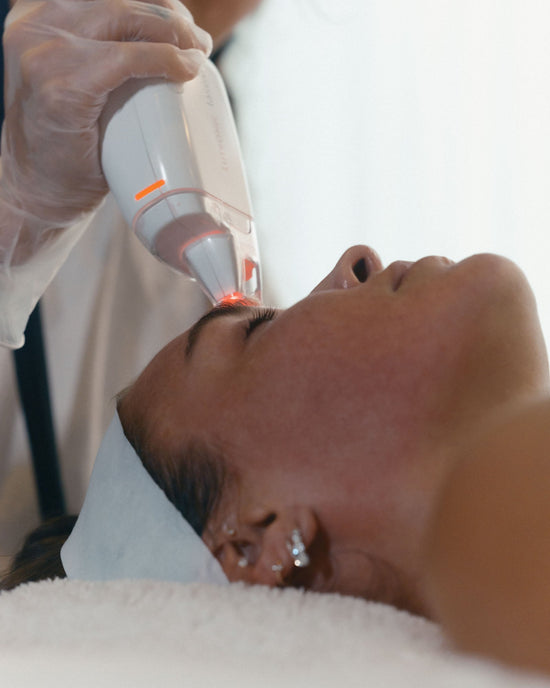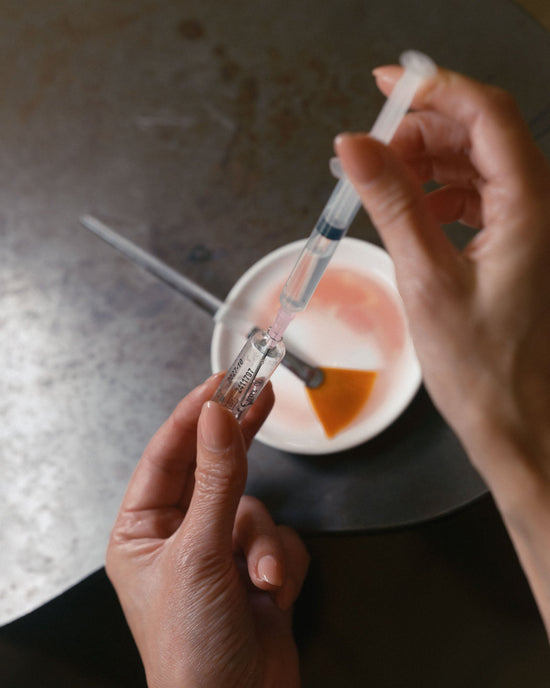When you’re dealing with acne, it can often feel like the world is out to get you. It’s not just your skin that is suffering, it’s your confidence too. In today’s KICHI Edit, we’ll reveal the true science behind acne, it’s scarring and how you can reverse its effects with our famous Baby Face laser.
The Science Behind Acne
Your skin is the largest organ in your body. It's also the most visible, so it's no surprise that acne has become such a problem over the years. Acne occurs when hair follicles are clogged with dead skin cells and oil, causing bacteria to grow. Most people are familiar with acne as pimples, but not everyone knows that acne can also take the form of blackheads or whiteheads, as well as cysts and nodules.
Unfortunately for those who suffer from this condition, there isn't one simple cure for every type. In fact, there are many different causes for acne. The key is identifying which cause(s) apply to you and then finding treatments that address them specifically. The first step is figuring out what kind of acne you have: mild (comedonal), moderate (inflammatory), or severe (nodular).
Acne Caused By Hormones
One of the main causes of acne can be our hormones. The sebaceous glands in our skin produce sebum, which is an oily substance that helps to lubricate and protect our skin. Our hormones play a key role in regulating the production of this.
If the regulation of sebum isn't at the optimal level, the excess sebum production ends up clogging our pores which then leads to the development of acne.
During puberty, the body undergoes hormonal changes that can cause an increase in androgens, such as testosterone. Androgens stimulate the sebaceous glands in the skin to produce more oil, which can trigger acne.
It's key to note that puberty is not the only time that hormonal acne can occur. Hormonal changes can also happen during menstruation, pregnancy, and menopause, which can result in acne in some individuals. Understanding the interplay between hormones and the skin's oil production can help us to better manage and treat our acne.
Acne Caused By Inflammation In The Gut
Our gut is home to trillions of microorganisms, commonly known as the gut microbiome. This plays a crucial role in regulating our immune system and maintaining overall health. When the balance of the gut microbiome is disrupted, it can lead to inflammation, which has been linked to a variety of health problems, including acne.
The exact link between gut inflammation and acne are not yet fully understood. However, recent studies suggest that inflammation of our gut can lead to the allowance of toxins and bacterias to leak into our bloodstream. When this happens, an immune response signals to our bodies, which can then lead to the inflammation of our skin and then the development of acne. Other studies suggest that an imbalanced gut has a link to inflammatory compounds that can also trigger acne.
Although the link between gut inflammation and acne is still an area of active research, there is lots of evidence to suggest that maintaining a healthy gut may be an imperative step towards managing and even sometimes fully preventing acne. (I highly recommend Qende. Use our code: iqdzqy2w for £ off.)
The Science Behind Acne Scarring
Acne scars are a common side effect of acne. They are caused by an overproduction of collagen after an inflammatory process. When this happens, the skin can't absorb the excess collagen and it gets trapped in the dermis (the middle layer of skin). In some cases, the scarring can be so severe that it leaves permanent discolouration or indentation on the skin.
More simply put, acne scars are often caused by inflammation. When your skin is inflamed, it becomes too irritated for healthy cells to grow back and replace the damaged ones.
There are different types of acne scars, including ice pick scars, boxcar scars, rolling scars, and hypertrophic scars. Ice pick scars are small but deep indentations in the skin that look like little holes. Boxcar scars are wide at the top and narrow at the bottom - they look like a box car that's hit something! Rolling scars look like waves in your skin; they're usually pinkish or red on top with white underneath them (which means they didn't heal properly). Hypertrophic scars are raised above your normal skin level; they're usually red or purple with a thick border around them (this means they didn't heal properly either).
Meet Our Laser Resurfacing Facials
Many people turn to retinoid creams and hyaluronic acids to treat their acne scars, but sometimes (unfortunately) treatment creams and serums just aren’t enough. Plus, to make it worse, the overuse of chemical exfoliants can disrupt the epidermal junction (our skins barrier) which can wholly aggravate acne scarring, which results in more harm than good.
Our laser resurfacing facials heal the skin from inside out, meeting in the middle. If you're looking for a non-invasive treatment to help improve the appearance of your acne scars, our famous Baby Face resurfacing laser facial may be the answer.
As mentioned in Iris Law’s Vogue France Beauty Secrets video, our Baby Face facial involves exposing the skin to laser light to stimulate collagen production and tighten the skin. Our laser is powered by a Lutronic non-ablative lithium laser, which is the only laser in the world to create microchannels deep into the dermis. (To learn more about microchannels, click here). This process allows up to 90% absorbency of targeted serums, compared to our at-home skincare which only penetrates at around 5%. This is extremely useful for treating acne scars because it stimulates the production of new collagen and elastin, which are two components of the dermal matrix that give your skin its strength and elasticity.
Our lithium Baby Face Laser can also reduce pore size by shrinking sebaceous glands and increasing blood flow, which can help reduce inflammation and redness associated with acne.
If your main concern is acne scarring, we strongly recommend our Baby Face Package (4 sessions). This package enables Natasha to regularly treat, elevate and enhance your overall skin health.





